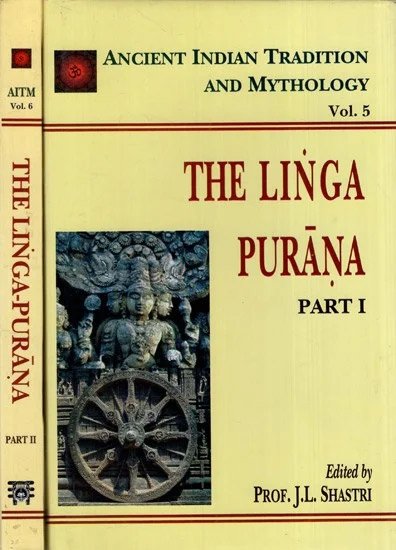The Linga Purana
by J. L. Shastri | 1951 | 265,005 words | ISBN-10: 812080340X | ISBN-13: 9788120803404
This page describes The Narrative of Yayati (continued) which is chapter 67 of the English translation of the Linga Purana, traditionally authored by Vyasa in roughly 11,000 Sanskrit verses. It deals with Shaiva pilosophy, the Linga (symbol of Shiva), Cosmology, Yugas, Manvantaras, Creation theories, mythology, Astronomy, Yoga, Geography, Sacred pilgrimage guides (i.e., Tirthas) and Ethics. The Lingapurana is an important text in Shaivism but also contains stories on Vishnu and Brahma.
Chapter 67 - The Narrative of Yayāti (continued)
Yayāti said:
1. Let the members of all castes beginning with the brahmins listen to my words in regard to this why I have decided that the kingdom should in no way be given to the eldest son Yadu.
2. My behest was not carried out by Yadu my eldest son. The son who is mentally opposed to his father is not approved of by good men.
3. The son who acts according to the instructions of his parents is praised by good men. He is the real son who behaves towards his parents in a manner befitting a son.
4. I have been treated with disrespect by Yadu, Turvasu, Druhyu and Anu.
5. My instructions were particularly honoured and carried out by Pūru. He is my youngest son by whom my old age had been taken over,
6. Because of Devayāni, Śukra had ordained that I would be attacked by old age. When, he was requested, my old age was made transferable by him.
7-10. This boon was given by Śukra himself—“The son who favours you shall be your heir to the kingdom.” May ye all, O sires, approve of it. Pūru shall then be crowned king.”
The Sages said:
“The son who is endowed with good qualities and. who is always beneficent to his parents deserves all welfare, although he may be the younger son. Lord Pūru deserves this kingdom since he is the son who has carried out your instructions. Because of the boon granted by Śukra this cannot be made otherwise.”
Sūta said:
The son of Nahuṣa was told thus by the delighted people of the land.
11. After crowning his son Pūru in his own kingdom he directed Turvasu his son to be the southern border chief.
12. Similarly the king employed the eldest son Yadu in the southern frontier and Druhyu and Anu in the west and in the north respectively.
13. After conquering the earth including the seven islands and seven oceans, the son of Nahuṣa divided the kingdom into three parts among his sons.
14. With the royal glory transferred to his sons and with the burden placed on his kins, the king became pleased. His mind was filled with delight.
15-24. In this context the following song was formerly sung by the great king Yayāti:—
A man shall be glorious if only he withdraws all his desires like the tortoise withdrawing all its limbs; otherwise not, even if he performs a crore of holy rites.
Lust is never quelled by the enjoyment of desires. Just as the fire becomes all the more blazing with oil poured into it so also it is heightened by the same.[1]
Whatever grain or barley the earth contains, the entire gold it has, and all the animals and women of the earth are not enough for the insatiable desire of even a single individual. Considering this fact, man should remain tranquil (i.e. free from desires).
When man has no sinful motives towards any living being mentally, verbally or physically he attains Brahman.
When man is not afraid of others, when others are not afraid of him, when he neither despises nor hates, he attains Brahman.
Happiness is attained by one who eschews covetousness which is difficult to avoid by wicked men, which does not age even if he ages and which is an ailment that ends only with his life.
When one ages, his hairs, his teeth, his eyes, his ears all do age. But greed alone remains free from old age[2]
Everything in respect of a person does age of its own accord, not otherwise. But the yearning for life and the craving for riches do not age even if the person ages.
The happiness arising from the fulfilment of desires in the world, and the great divine happiness of heaven do not merit even a sixteenth part of that happiness which one has when thirst for objects is dispelled.[3]
After saying this that saintly king entered the forest accompanied by his wives.
25-28. He performed penance on the peak Bhṛgutuṅga.[4] There the renowned king practised fast and attained heaven along with his wives. His line of successors consisted of five holy kings who were honoured even by divine sages. The entire earth is pervaded by these descendants like the rays of the sun. By reading or listening to the holy narrative of Yayāti a man becomes intelligent, rich, long lived, famous and blessed with issues. Liberated from all sins he shall be honoured in the world of Śiva.
Footnotes and references:
[2]:
This is an oft-quoted verse.
[3]:
This is an oft-quoted verse.
